ALSO, THE FILM STAGE ESSAY ON 'PASSION' - SPOILERS BELOW
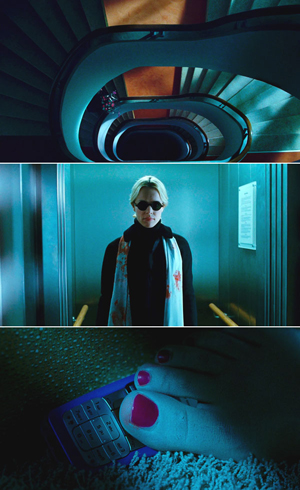 Duncan Gray has posted an essay at Fandor's Keyframe blog that examines the dream aspect of Brian De Palma's Passion within the context of movie dreams and noir expressionism. Here's an excerpt:
Duncan Gray has posted an essay at Fandor's Keyframe blog that examines the dream aspect of Brian De Palma's Passion within the context of movie dreams and noir expressionism. Here's an excerpt:Passion was treated as minor De Palma, and fair enough for a thriller built from an array of elements—doppelgangers, split-screen murders, music by Pino Donaggio, voyeuristic sexuality—that De Palma had used, more memorably, decades earlier. Still, it has something that so many mainstream American movies today are lacking: an appreciation for cinema’s irrational power over its audience. And De Palma, old-school enough that he closes Passion with a title card reading “The End,” made a film that’s best understood through the psychodramatic lens of classic noir, while at the same time working a twist on his own formula.
In discussing Passion as a dream narrative, one must be careful, because that’s a game that can keep the audience guessing. The heroine goes to bed at the beginning of the film, and subsequently is shown falling asleep and suddenly waking up nearly half a dozen times. De Palma adapted his script from a French thriller called Love Crime (Alain Corneau, 2010), from which Passion gets its Euro-chic setting, the framework of its murder plot, and a battle of feminine cunning that should appeal to anyone who feels the word “bitch” may be used admiringly. But Love Crime plays the material relatively straight, with a very different ending. The feverish dream angle belongs to De Palma’s version alone.So the best place to start is the one sequence I can say with confidence is “real,” the opening scene. Isabelle (Rapace) and Christine (McAdams), two coworkers at an ad agency, are meeting at Christine’s apartment after hours to discuss the latest campaign. As they share a drink and a few laughs, it’s instantly clear which of the two is dominant. Christine has perfect confidence, perfect style, perfect taste, a perfect apartment. Isabelle is much more timid and repressed. Buttoned-up in an asexual black pantsuit (which she’ll wear for most of the film, despite Christine’s many colorful costume changes), Isabelle is clearly in the thrall of her mentor, and thrilled that such an alpha-female would keep her as a confidante. She admires Christine—is it just professional, or something else? Then Christine’s perfect boyfriend arrives, and Isabelle, sensing that she’s become a third wheel, excuses herself and goes home. We see Isabelle drifting off to sleep, and then the story begins in proper: a tale of intrigue and murder as convoluted as any of Alfred Hitchcock‘s—and much clammier than Richard Wanley’s.
As a thriller, Passion has too many implausible twists to name. But as a glimpse into Isabelle’s psyche, it’s a hypnotic clash of identities. Isabelle competes with Christine. She sleeps with Christine’s boyfriend. Christine suddenly kisses Isabelle—a moment they scarcely dwell on—then teaches her to undo her top buttons to hook a male client. (“You’re more like me than you think,” Christine teases her.) And throughout this, the film’s style tilts towards insanity. Rapace plays Isabelle as a perpetually stunned figure, acting for most of the film like a helpless spectator, even to her own actions. The script is often daftly illogical; in one scene, Christine goes from threatening Isabelle to inviting her to a dinner party within a few seconds. Midway through, the film suddenly shifts into full-blown noir expressionism, with wall-to-wall canted angles and Venetian-blind shadows. The plot mechanisms by which someone may or may not get away with murder are as complex as they are irrelevant. Passion is more a series of anxious fantasies: to be Christine, to fuck Christine, to kill Christine. Though of course, in a nightmare, can you count on someone to stay dead?
The crowning moment, where Passion adds something valuable to De Palma’s canon, is the final set piece. This scene is De Palma in overheated form, the sort of ludicrous sequence that gets excruciating suspense from being so drawn out, and it involves a murder taking place in Isabelle’s apartment late at night, just as a police inspector drops by to “pay his respects.” There are numerous things that are logically “off” with this scene, not the least of which is why the inspector, who by this point in the contorted plot has been thoroughly fooled, would choose to pay a social visit in the middle of the night. But the sequence builds to a fever pitch, and then climaxes with the money shot: Isabelle convulsing awake, in the same bed she’d drifted off to sleep in after that opening scene—only now with a crucial, impossible detail.
De Palma is self-aware filmmaker, not above referencing himself as well as his predecessors. The final shot of Passion, a high-angle view of the heroine waking up from a nightmare, is nearly identical to the shots that closed Carrie and Dressed to Kill. But here, De Palma adds one of his most mischievous touches: When Isabelle wakes up, the murder victim is still there, lying on the floor next to the bed, perfectly preserved from the prior sequence. As a finale, it’s a bonkers paradox: the construction of the editing means that this final sequence (if not the entire plot of the film) simultaneously must be a dream and can’t be a dream. There is no logical explanation, nor can there be, nor should there be.
This kind of gamesmanship may turn some audiences off, as if the chain has been yanked a little too hard. But for such a modest, apparently trashy film, it’s also a sophisticated touch, and it relies on an audience willing to be subservient to the pure sounds and images that envelope them. It goes back to Richard Wanley’s epilogue, regaining his bearing after his feature-length nightmare; or to the hero of Caligari, confronting his horror back in real life; or to anyone who’s seen a scary movie late at night and finds it difficult to shake the unease. What De Palma’s Passion toys with, in a modern, old-fashioned way, is an idea both dreamlike and quintessentially cinematic: the fear (or hope) that what you’ve seen will be waiting for you on the other side.
FILM STAGE ESSAY ON 'PASSION'
By mere coincidence, The Film Stage concluded its "Summer of De Palma" collection of essays that same day by posting Brian Roan's essay on Passion...
Here is where De Palma, formerly so sedate and conventional, throws off his cape to reveal the cinematic mad genius underneath. The first act’s rote dramatics melt away, leaving behind a mad dancing skeleton that begs to be witnessed. In line with Isabelle’s deteriorating sense of security and mental stability, the film morphs into an elaborate and expert exhibition of neo-noir and Old Hollywood tropes, both stylistic and thematic. Canted angles, deep shadows, split screens. What began as a tired retread of ’90s-style potboilers becomes what only De Palma can make: a stirring melange of modern edge and classical styling.This is the power of De Palma and the thing that makes him, for all the world, one of the most interesting American directors. Most of what he does is nothing that hasn’t been done before. He’s using techniques that have permeated the history of cinema from the very beginning. But he employs these tricks with so much skill and nonchalance in execution that their very being within a movie becomes bold. Unlike Tarantino, who trucks in homage that verges on parody (to great effect), De Palma works entirely in earnest creation. He isn’t doing these things to signal his cinematic bona fides, but to more eloquently get across his point. The point, in this case, being that Isabelle has completely broken mentally.
Passion‘s mounting dream logic is almost Lynchian, bizarre things occurring and resolving with seemingly no impact on narrative. The bafflement of the audience rises with the paranoia and franticness of the protagonist. It’s an operatic, arch transposition of mental state onto aesthetic presentation. It is, as previously stated, Lynchian in narrative, but more akin to Irving Rapper in terms of tone and aesthetic, making it at once seemingly more accessible while also forging an even deeper wedge between the film and a more modern audience.
Updated: Monday, September 12, 2016 12:13 AM CDT
Post Comment | View Comments (5) | Permalink | Share This Post




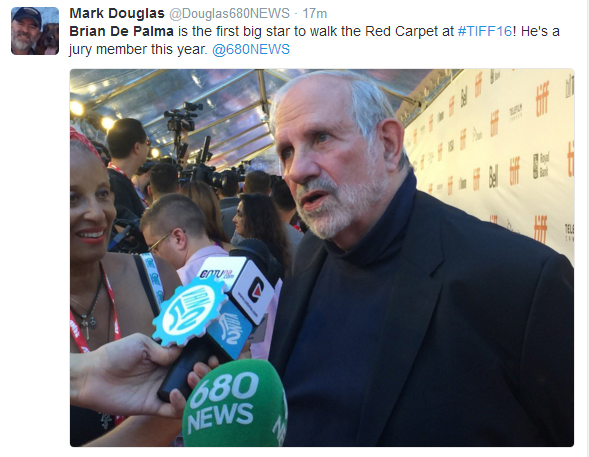
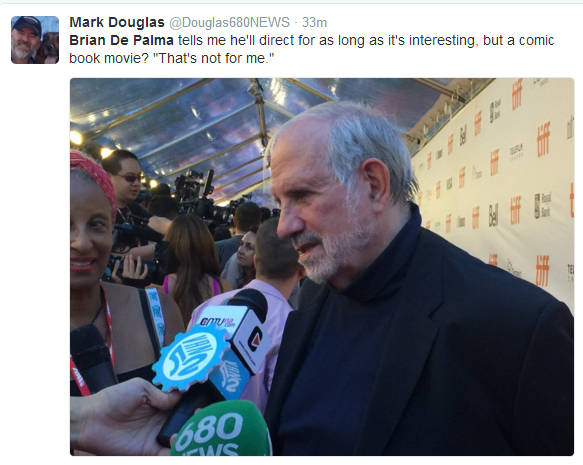


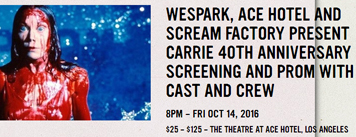
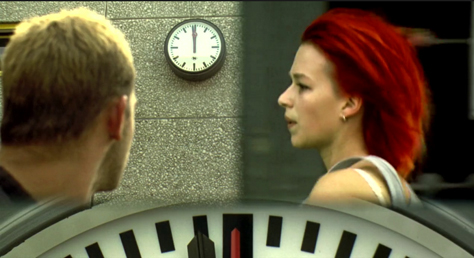
 A
A 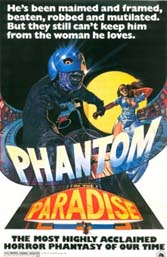 As part of its
As part of its 

 Brian De Palma will be part of the three-person jury for the
Brian De Palma will be part of the three-person jury for the 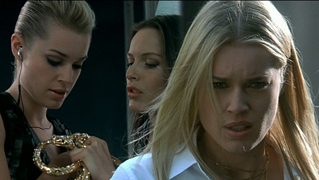 The BBC polled 177 critics from around the world, asking them to submit their top ten films of the 21st century. The lists were then tallied to create a list of the
The BBC polled 177 critics from around the world, asking them to submit their top ten films of the 21st century. The lists were then tallied to create a list of the